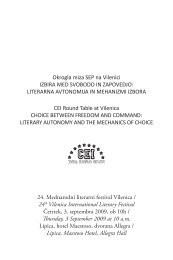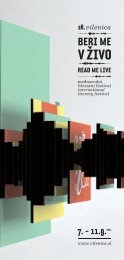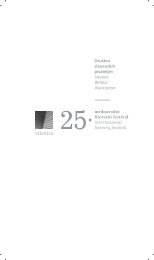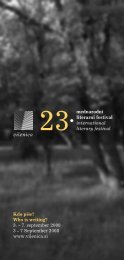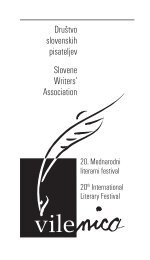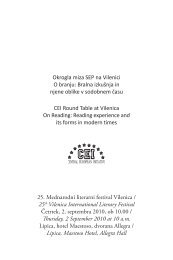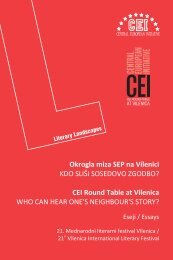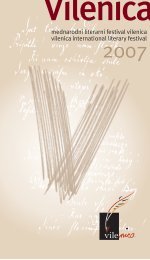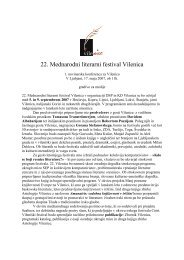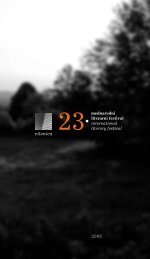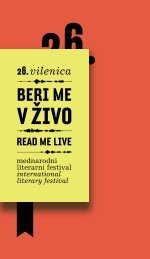Publikacija SEP 2011 - Vilenica
Publikacija SEP 2011 - Vilenica
Publikacija SEP 2011 - Vilenica
Create successful ePaper yourself
Turn your PDF publications into a flip-book with our unique Google optimized e-Paper software.
(which is a rather wide field of discussion, concerning virtually everyone<br />
involved in its making) – a reproduced work without aura. In his<br />
essay, Das Kunstwerk im Zeitalter seiner technischen Reproduzierbarkeit<br />
(The Work of Art in the Age of Mechanical Reproduction), Benjamin<br />
says: “In general, we could say that the reproduction technique detaches<br />
the reproduced object from tradition. By making multiple reproductions,<br />
it substitutes the unique phenomenon of an artistic work with<br />
the common.” 5 That is why I believe a poetry performance should be<br />
viewed in the light of its uniqueness, auratics, when the author, through<br />
reading, through his or her voice, stress, intonation, through interpretation,<br />
performs the poem in all its authenticity. We live in a time when<br />
it is popular to make the best of charts; it is interesting to note that some<br />
contemporary poets were also excellent interpreters and their interpretations<br />
have stayed for good. In Slovene poetry tradition, these poets are<br />
Dane Zajc, Tomaž Šalamun and Jure Detela, and among foreign poets,<br />
I will definitely always remember the performance of the late Danish<br />
poet Inger Christensen, as well as the Polish poet Eugeniusz Tkaczyszyn<br />
Dycki and the Irish poet Gearoid McLaughlin, who appeared at the<br />
<strong>Vilenica</strong> Festival.<br />
VI. Conclusion: Indirect Knowledge of Literature vs Poetry<br />
Performance – Poetry’s Added Value<br />
Apart from its auratic aspect, a literary performance has another<br />
important dimension: the author’s performance is a resistance against<br />
indirect knowledge of literature. In the world of information (in this<br />
case on books and therefore, on a particular literary work) and mass<br />
production of books, we are condemned to indirect knowledge of literature,<br />
which, however, is not a new phenomenon in history. In one<br />
of his interviews, Roger Chartier mentions that Don Quixote was the<br />
first literary work that people knew without having read it. Today,<br />
5 Walter Benjamin: Izbrani spisi, (prevod Frane Jerman … e tal., SH, Ljubljana 1998, p. 151);<br />
Slovene translation [Translator's note].<br />
19



